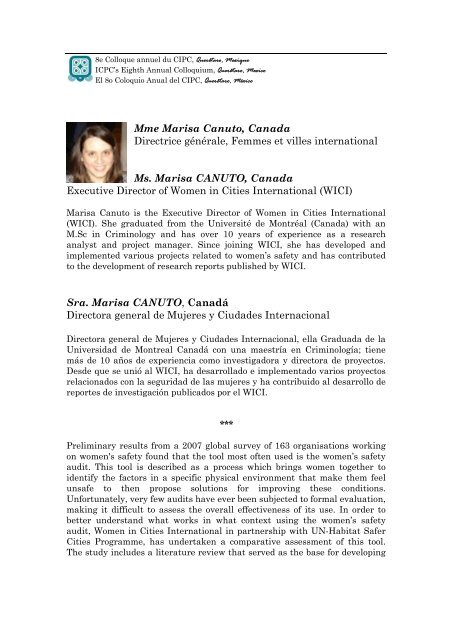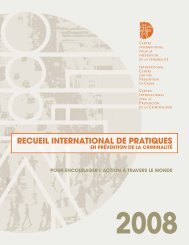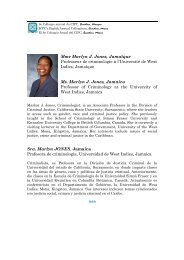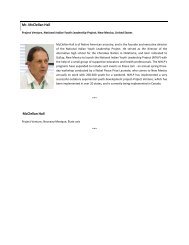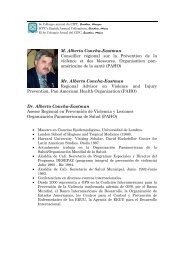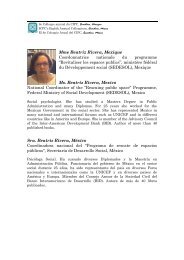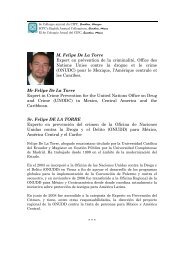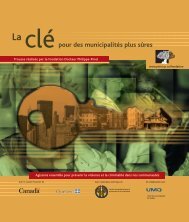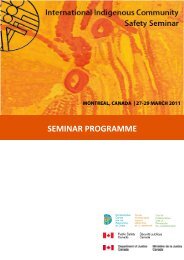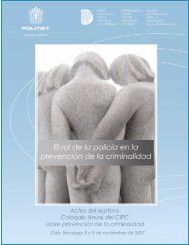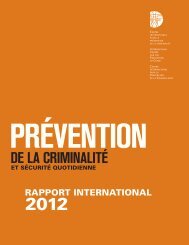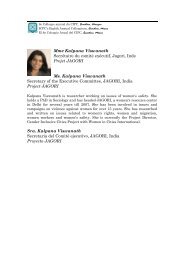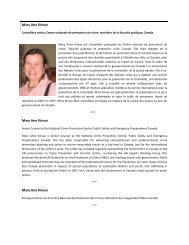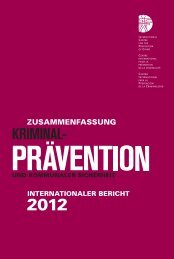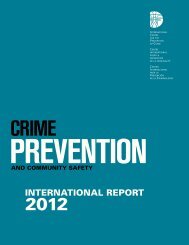Ms. Marisa Canuto - International Centre for the Prevention of Crime
Ms. Marisa Canuto - International Centre for the Prevention of Crime
Ms. Marisa Canuto - International Centre for the Prevention of Crime
Create successful ePaper yourself
Turn your PDF publications into a flip-book with our unique Google optimized e-Paper software.
8e Colloque annuel du CIPC, Querétaro, Mexique<br />
ICPC’s Eighth Annual Colloquium, Querétaro, Mexico<br />
El 8o Coloquio Anual del CIPC, Querétaro, México<br />
Mme <strong>Marisa</strong> <strong>Canuto</strong>, Canada<br />
Directrice générale, Femmes et villes international<br />
<strong>Ms</strong>. <strong>Marisa</strong> CANUTO, Canada<br />
Executive Director <strong>of</strong> Women in Cities <strong>International</strong> (WICI)<br />
<strong>Marisa</strong> <strong>Canuto</strong> is <strong>the</strong> Executive Director <strong>of</strong> Women in Cities <strong>International</strong><br />
(WICI). She graduated from <strong>the</strong> Université de Montréal (Canada) with an<br />
M.Sc in Criminology and has over 10 years <strong>of</strong> experience as a research<br />
analyst and project manager. Since joining WICI, she has developed and<br />
implemented various projects related to women’s safety and has contributed<br />
to <strong>the</strong> development <strong>of</strong> research reports published by WICI.<br />
Sra. <strong>Marisa</strong> CANUTO, Canadá<br />
Directora general de Mujeres y Ciudades Internacional<br />
Directora general de Mujeres y Ciudades Internacional, ella Graduada de la<br />
Universidad de Montreal Canadá con una maestría en Criminología; tiene<br />
más de 10 años de experiencia como investigadora y directora de proyectos.<br />
Desde que se unió al WICI, ha desarrollado e implementado varios proyectos<br />
relacionados con la seguridad de las mujeres y ha contribuido al desarrollo de<br />
reportes de investigación publicados por el WICI.<br />
***<br />
Preliminary results from a 2007 global survey <strong>of</strong> 163 organisations working<br />
on women's safety found that <strong>the</strong> tool most <strong>of</strong>ten used is <strong>the</strong> women’s safety<br />
audit. This tool is described as a process which brings women toge<strong>the</strong>r to<br />
identify <strong>the</strong> factors in a specific physical environment that make <strong>the</strong>m feel<br />
unsafe to <strong>the</strong>n propose solutions <strong>for</strong> improving <strong>the</strong>se conditions.<br />
Un<strong>for</strong>tunately, very few audits have ever been subjected to <strong>for</strong>mal evaluation,<br />
making it difficult to assess <strong>the</strong> overall effectiveness <strong>of</strong> its use. In order to<br />
better understand what works in what context using <strong>the</strong> women’s safety<br />
audit, Women in Cities <strong>International</strong> in partnership with UN-Habitat Safer<br />
Cities Programme, has undertaken a comparative assessment <strong>of</strong> this tool.<br />
The study includes a literature review that served as <strong>the</strong> base <strong>for</strong> developing
8e Colloque annuel du CIPC, Querétaro, Mexique<br />
ICPC’s Eighth Annual Colloquium, Querétaro, Mexico<br />
El 8o Coloquio Anual del CIPC, Querétaro, México<br />
a sense <strong>of</strong> perceived good practice, as well as an analysis <strong>of</strong> 18 open-ended<br />
interviews from organisations who have implemented safety audits across <strong>the</strong><br />
world. This presentation will cover <strong>the</strong> main findings <strong>of</strong> this assessment.
The Women’s Safety Audit:<br />
A Universal Tool
Women in Cities <strong>International</strong><br />
• Exchange network <strong>of</strong> partners on issues<br />
pertaining to gender equality and <strong>the</strong><br />
participation <strong>of</strong> women in cities<br />
• Develop and promote policies / programs<br />
– by creating and disseminating knowledge<br />
– by facilitating ti in<strong>for</strong>mation exchange<br />
– by yproviding technical assistance<br />
• Priority issue: Women’s Safety
Women’s Safety Audits (WSA):<br />
A Universal Tool<br />
• Description <strong>of</strong> Women’s Safety Audit Tool<br />
• Main results from assessment on WSA by WICI<br />
and UN-Habitat Safer Cities Programme<br />
• Introduction to Status <strong>of</strong> Women Canada<br />
project ‘Creating Safer Cities <strong>for</strong> Marginalized<br />
Women and <strong>for</strong> Everyone’
Women’s Safety Audit<br />
• Concept by METRAC<br />
– Involves walking<br />
through a physical<br />
environment with a<br />
checklist to identify<br />
factors that cause<br />
insecurity<br />
– Making<br />
recommendations and<br />
bringing g about change
‘Six Principles <strong>of</strong> Design from<br />
Women’s Point <strong>of</strong> View’ (City <strong>of</strong> Montreal)<br />
1) Know where you are<br />
and where you are<br />
going<br />
2) See and be seen
‘Six Principles <strong>of</strong> Design from<br />
Women’s Point <strong>of</strong> View’ (City <strong>of</strong> Montreal)<br />
3) Hear and be heard 4) Be able to get help
‘Six Principles <strong>of</strong> Design from<br />
Women’s Point <strong>of</strong> View’ (City <strong>of</strong> Montreal)<br />
5) Maintenance and planning<br />
6) Act toge<strong>the</strong>r<br />
Photo by CISCSA<br />
PROGRAMA REGIONAL<br />
CIUDADES SIN<br />
VIOLENCIA HACIA LAS<br />
MUJERES, CIUDADES<br />
SEGURAS PARA<br />
TOD@S,<br />
ROSARIO, ARGENTINA
WSA: What Works and Where?<br />
• Study by WICI & UN-<br />
Habitat t Safer Cities<br />
Programme<br />
• Goals:<br />
– Identify what<br />
works in what ht<br />
contexts<br />
– Identify concrete<br />
outcomes from<br />
<strong>the</strong> use <strong>of</strong> <strong>the</strong><br />
safety audit
Methodology<br />
• Literature Review<br />
• 18 survey interviews<br />
– open-ended questions<br />
– email, telephone and face-to-face<br />
– from Africa (6), Canada (5), Europe<br />
(3), India (2) and Latin America (2)
Limits <strong>of</strong> <strong>the</strong> study<br />
• Different terms used <strong>for</strong> WSA<br />
• Language barriers<br />
• Time constraints (3 months)<br />
• Different interpretation <strong>of</strong><br />
questions<br />
• Not a representative sample
WSA: What Works and Where ?<br />
- Reference guide <strong>for</strong> future WSA<br />
- Highlights best practices and local<br />
adaptations<br />
- Demonstrates concrete outcomes<br />
from <strong>the</strong> use <strong>of</strong> <strong>the</strong> tool<br />
- Illustrates some <strong>of</strong> <strong>the</strong> range <strong>of</strong><br />
experiences, outcomes and challenges<br />
in different settings
Successful Practices<br />
• Focus on <strong>the</strong> local level<br />
• Use expertise <strong>of</strong> residents<br />
• Develop partnerships with local<br />
governments<br />
• Local diagnosis <strong>of</strong> women’s safety<br />
• A process with several steps
Positive Outcomes<br />
• Changes to <strong>the</strong> physical environments<br />
• Strategy <strong>for</strong> raising awareness<br />
• Empowering participants<br />
B ildi t th i d i i<br />
• Building, streng<strong>the</strong>ning and increasing<br />
partnerships with local governments
Negative Outcomes<br />
• Difficulty involving marginalized<br />
groups<br />
• Lack <strong>of</strong> follow-up or evaluation<br />
• Limited resources / support <strong>for</strong><br />
implementation<br />
• Loss <strong>of</strong> gender focus
Future directions<br />
• Need <strong>for</strong> greater evaluation <strong>of</strong> women’s<br />
audit experiences<br />
• Need <strong>for</strong> evaluation on <strong>the</strong> impact <strong>of</strong> WSA<br />
– Changes to environment<br />
– Changes to policy<br />
– Changes to use <strong>of</strong> space<br />
– Changes to levels l <strong>of</strong> crime/victimization<br />
i i i i<br />
• Need <strong>for</strong> adaptation to private spaces (i.e.<br />
housing units, etc.)<br />
• Collecting evidence <strong>of</strong> <strong>the</strong> use <strong>of</strong> WSA with<br />
marginalized groups
Creating Safer Communities <strong>for</strong><br />
Marginalized Women and Everyone<br />
• Funded by Status <strong>of</strong><br />
Women Canada<br />
• Goals:<br />
– build partnerships<br />
between women’s groups<br />
and municipalities<br />
i – Implementation <strong>of</strong> safety<br />
audit walks<br />
– Increase <strong>the</strong> active<br />
participation <strong>of</strong><br />
marginalized women<br />
– Disseminate lessons<br />
learned
Implementing partners<br />
• Aboriginal Women<br />
– Women <strong>of</strong> <strong>the</strong> Dawn<br />
– Regina, Saskatchewan<br />
• Immigrant and visible minority<br />
women<br />
– Catholic Crosscultural Services<br />
– Peel, Ontario<br />
• Elderly women<br />
– <strong>Centre</strong> des aînés de Gatineau<br />
– Gatineau, Quebec<br />
• Women with disabilities<br />
i<br />
– Action femmes handicapées<br />
(Montréal)<br />
– Montréal, Québec
Main Activities<br />
November 2007 to March 2009<br />
• Safety audits training<br />
i<br />
• Training on building partnerships with local governments<br />
• Training on local diagnosis<br />
• Implementation <strong>of</strong> safety audits (3 audits per group)<br />
April 2009 to August 2010<br />
• Implementation <strong>of</strong> recommendations <strong>of</strong> safety<br />
approaches<br />
April 2010 to November 2010<br />
• Report on <strong>the</strong> findings <strong>of</strong> <strong>the</strong> project
Some adaptations to WSA<br />
- Culturally ll sensitive<br />
- Additional factor assessed:<br />
Accessibility<br />
- Translation <strong>of</strong> tools in<br />
several languages<br />
- Use <strong>of</strong> tape recorder<br />
during WSA<br />
- Checklist adapted to needs<br />
- Different methods used to<br />
increase <strong>the</strong> participation<br />
<strong>of</strong> women
For more in<strong>for</strong>mation on<br />
WICI<br />
Women in Cities <strong>International</strong><br />
465 Saint-Jean, suite 803<br />
Montréal, Québec, H2Y 2R6<br />
Tel.:514-861-6123<br />
6123<br />
Fax.: 514-288-8763<br />
www.womenincities.org<br />
i i<br />
www.mujeresyciudades.org<br />
www.femmesetvilles.org


